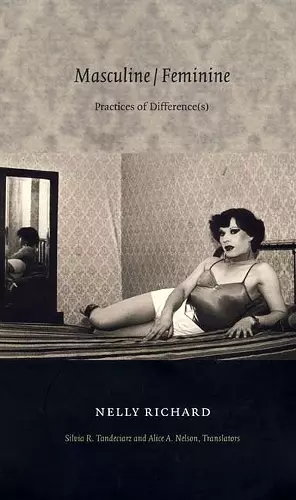Masculine/Feminine
Practices of Difference(s)
Nelly Richard author Alice A Nelson translator Silvia R Tandeciarz translator
Format:Hardback
Publisher:Duke University Press
Published:28th Apr '04
Currently unavailable, and unfortunately no date known when it will be back

A leading feminist theorist shows why the feminist movement has been crucial not simply to the liberation of women but to understanding the ways in which power operated under the military regime in Chile
Develops some of the issues brought to the fore during the 1987 International Conference on Latin American Women's Literature in Santiago. This book theorizes on why the feminist movement has been crucial not only to the liberation of women but also to understanding the ways in which power operated under the military regime in Chile.Nelly Richard is one of the most prominent cultural theorists writing in Latin America today. As a participant in Chile’s neo-avantgarde, Richard worked to expand the possibilities for cultural debate within the constraints imposed by the Pinochet dictatorship (1973–1990), and she has continued to offer incisive commentary about the country’s transition to democracy. Well known as the founder and director of the influential Santiago-based journal Revista de crítica cultural, Richard has been central to the dissemination throughout Latin America of work by key contemporary thinkers, including Néstor García Canclini, Jacques Derrida, Fredric Jameson, and Diamela Eltit. Her own writing provides rigorous considerations of Latin American identity, postmodernism, gender, neoliberalism, and strategies of political and cultural resistance.
Richard helped to organize the 1987 International Conference on Latin American Women’s Literature in Santiago, one of the most significant literary events to take place under the Pinochet dictatorship. Published in Chile in 1993, Masculine/Feminine develops some of the key issues brought to the fore during that landmark meeting. Richard theorizes why the feminist movement has been crucial not only to the liberation of women but also to understanding the ways in which power operated under the military regime in Chile. In one of her most widely praised essays, she explores the figure of the transvestite, artistic imagery of which exploded during the Chilean dictatorship. She examines the politics and the aesthetics of this phenomenon, particularly against the background of prostitution and shantytown poverty, and she argues that gay culture works to break down the social demarcations and rigid structures of city life. Masculine/Feminine makes available, for the first time in English, one of Latin America’s most significant works of feminist theory.
“At last, Nelly Richard’s work is available for English-language readers. A leading figure in the theater of Latin American critical debate, Nelly Richard has written with unorthodox brilliance about the Chilean transition to democracy, North-South cultural relations, and the value of aesthetic intervention to rethinking the politics of difference.”—Francine Masiello, author of The Art of Transition: Latin American Culture and Neoliberal Crisis
“The Chilean publication of this book and of its companion volume (The Insubordination of Signs) confirmed and advanced Nelly Richard’s reputation as one of the foremost critical voices of the age. Richard’s brand of cultural critique, informed by a thorough attention to contemporary forms of subjectivity, is unmatched in the force of its theoretical articulation, its aesthetic sensitivity, and its sharp deployment of political strategies. Nelly Richard is today an essential reference for intellectual work in Latin America and beyond.”—Alberto Moreiras, author of The Exhaustion of Difference: The Politics of Latin American Cultural Studies
"Nelly Richard wrestles with the materiality of critique so that it maintains the inscriptions of antagonism, making it an indispensable instrument for an effective democratic culture. In Masculine/Feminine, that antagonism is explored through a consideration of gender and how authority and power weave their apparent neutrality and objectivity in the masculine register. The disruptive feminist strategies deployed by the writers and artists considered here beckon to an elsewhere where creativity, fantasy, pleasure, taste, and style mingle in the ‘figural and strategic repertoires of seduction and sedition.’”—George Yúdice, author of The Expediency of Culture: Uses of Culture in the Global Era
ISBN: 9780822333029
Dimensions: unknown
Weight: 268g
112 pages